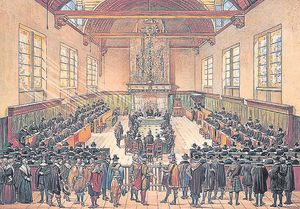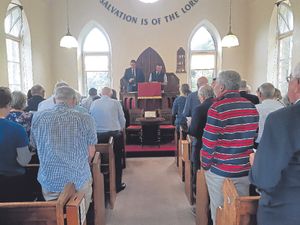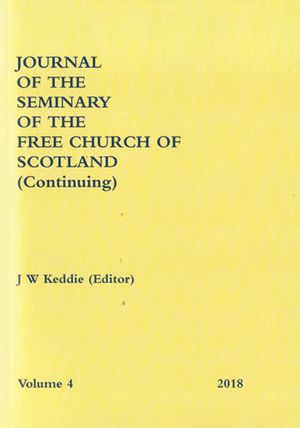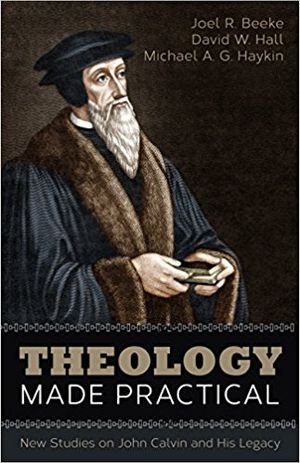The date is Monday 6 May 1619. The place is the ‘Great Church’ in the influential city of Dordrecht (or Dort) in the central Netherlands. Since November 1618 (300 years ago, this month) the Great Synod of Dort has been meeting daily; a total of 154 sessions have been held.
It is thought that just over 100 delegates have attended: we know the names of 96 of them. They have been representing the Reformed Churches of most of the states of Europe.
The most notable absentees have been the French. At the last minute their king, Louis XIII, withdrew permission for them to attend. Now the business of the Synod is concluded and its Canons are being published by means of a public reading in the city’s cathedral.
Doctrines of grace
The Canons of Dort were the original articulation of the so-called ‘Five Points of Calvinism’ or — a term greatly to be preferred — ‘The doctrines of grace’.
This does not, of course, mean that the doctrines of grace were a seventeenth-century theological novelty. The theology they expounded was substantially that shared by both major wings of the Reformation, Lutheran and Reformed, as taught by the two major Reformers, Luther and Calvin.
Moreover, the same theology was spelt out by Augustine in the fifth century and held by the whole of western Christendom until the medieval Roman Church began to drift into heresy. Further, Augustinian theology was itself the common property of the whole people of God, because it was in tune with the apostolic doctrine of the New Testament.
Controversy
The Synod of Dort was convened because, for the past 35 years, the Dutch Reformed Church had been racked by a controversy, one that would become associated especially with the name of Jacobus Arminius.
The problem began with a rather extreme Calvinist group led by Francis Gomarus, whose teaching, Arminius argued, turned God into a tyrant. Arminius prepared a document indicating five points at which he disagreed with Gomarus. It was in response to these five points that the Synod articulated the doctrines of grace.
Not an Arminian
Now, Arminius was no ‘Arminian’ in the sense in which history has come to understand the term. It would be truer to describe him as an inconsistent Calvinist, and it was his inconsistencies (rather than his positive errors) which the Synod sought to address. In doing so, it distanced itself as much from Gomarus as from Arminius.
Arminius’ five points may be summarised as follows:
- God’s eternal purpose is to save those who believe and persevere; the grace of the Holy Spirit is the essential prerequisite of faith and perseverance.
- Jesus Christ died to obtain redemption for all people, but faith is necessary for the enjoyment of this redemption.
- The human race in sin is totally depraved; the sinner has no free will, and is completely unable to think, will, or do any good, or to exercise saving faith, without regeneration.
- The human being is in absolute need of grace to begin, continue and accomplish any good, and this applies even to the regenerate. Grace, however, is not irresistible.
- On the question whether a believer can, through negligence, become devoid of grace, further study of the Scripture is necessary before a judgment can be made.

Dort’s response
The Synod of Dort replied with a document consisting of four sections. The third and fourth of Arminius’ points were dealt with together, because the Synod was in complete agreement with Arminius’ third point. (It’s ironic how modern Arminians often take human free will as their starting point, thus contradicting Arminius!).
The inconsistencies in Arminius’ teaching are obvious. The doctrines of total depravity and the absolute priority of grace, do not sit easily with the doctrines of resistible grace and universal redemption.
The Synod of Dort tidied up these inconsistencies with the four main points which it made over against Arminius:
- The logical outcome of Arminius’ first point is that there is a particular individual election (God has chosen particular individuals to eternal life, see Ephesians 1:4), a deduction which Arminius was hesitant to make.
- From this it follows, contrary to Arminius’ second point, that the benefits of Christ’s death are intended and effective specifically for those so chosen (‘the elect’).
- In its application to the elect, God’s grace accomplishes his purpose irresistibly; not by tyrannical force, but by God’s gentle wooing.
- That the elect should ever become devoid of grace is, both scripturally and logically, unthinkable.
Christ-centred
Here, then, are four of the ‘Five Points of Calvinism’. The fifth is identical with Arminius’ third point. In their explanation of these five main points, the Canons are absolutely Christ-centred and Cross-centred.
In the short compass of an article like this, it is not possible to provide a comprehensive exposition of the doctrines of grace. What I propose to do, therefore, is to select just one paragraph from the second section of the Canons of Dort for a detailed examination. This section is headed, ‘On Christ’s death and Human Redemption thereby’, and our paragraph reads:
‘For this was God the Father’s unconditioned resolve, and most gracious will and application, that the life-giving and saving power of his very precious Son’s death should extend to all the elect, in order to give to them alone justifying faith, thereby leading them infallibly to the goal of salvation: that is to say, God willed that Christ, by the blood of the cross (by which he ratified the new covenant) should effectually redeem out of every people, tribe, nation and language, all those and only those who from eternity were elect to salvation and were given to him by the Father; that he should give them faith (which, along with the other saving gifts of the Holy Spirit, he obtained for them by his death); that he should cleanse them by his blood from all sins, both original and enacted, as much from those committed since as from those committed before faith; that he should faithfully preserve them all the way to the end; and that he should cause them to stand before him at last without any blemish or spot, full of glory’.
Unconditional
According to this paragraph, the Father’s resolve to save the elect is unconditioned. His saving purpose is entirely self-motivated and free from all constraint. There is nothing that a sinner can do to arrest God’s attention. He saves whom he will, when he will.
The distinction between will and application is important. God never leaves incomplete any work which he begins. He never fails to do that which he purposes. Having willed the salvation of his elect, he must fulfil their salvation in order to remain true to himself.
Christ crucified
The saving purpose of the Father is focused in Christ crucified. To give up his Son was an immensely costly act, the highest price that could conceivably be paid. How hideous is sin, that nothing but this gift of divine super-extravagance could atone for it!
The little word ‘all’ is important. There is not one of God’s elect people to whom God will fail to apply the saving worth of his Son’s sacrifice. The salvation of every one of them is infallibly certain.
The word I have translated ‘leading them’ is illustrative. It means ‘to bring through’ and reminds us of the many tribulations through which we must enter God’s kingdom. But it also speaks of the assurance we have that he will bring us through every trial to glory, where trials and tribulations are for ever past.
It also means ‘to bring to a goal’ and so highlights the fact that God’s elect have a secure destiny. It can mean ‘to persuade’ and thus focuses on the tenderness of God’s dealings with his people.
Final glorification
The second half of the paragraph concerns the will of the Father for his people in Christ, and contains five strands: (1) that Christ should redeem his people unfailingly; (2) that he should furnish them with his Spirit; (3) that they will know total cleansing from every sin; (4) that Christ should preserve his people in unchanging faithfulness; (5) that their final glorification should be assured. Because the will of God is unerringly achieved, all these benefits are guaranteed to every believer.
The Trinitarian nature of our salvation is apparent in this paragraph. The Father willed the salvation of his elect and gives his people to the Son. The Son shed his blood on behalf of the elect and his death is the basis of all the blessings of salvation. The Spirit is given to the elect to make those blessings a reality in their experience.
Final prayer
I finish by quoting the final prayer of the Canons: ‘May God’s Son, Jesus Christ, who, seated at the Father’s right hand, gives gifts to people, sanctify us in truth, lead those who err into the truth, shut the mouths of those who pervert sound doctrine, and equip faithful ministers of his Word with a spirit of wisdom and discernment, so that all their preaching may result in God’s glory and the up-building of their hearers. Amen’.
Jonathan Bayes has recently been called as pastor of Stanton Lees Chapel, Derbyshire.
This article first appeared in the March 2000 edition of Evangelical Times.






















